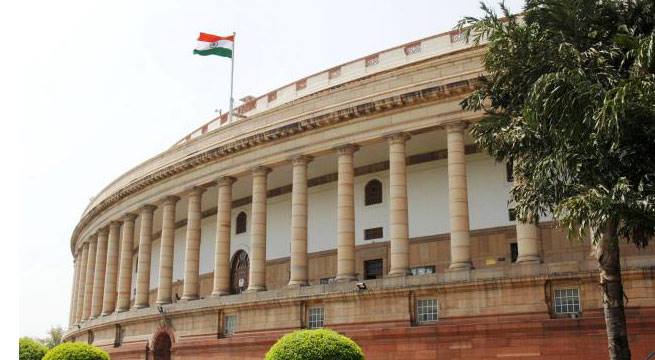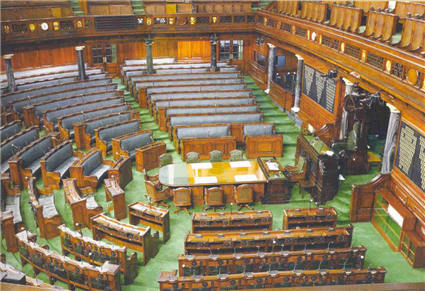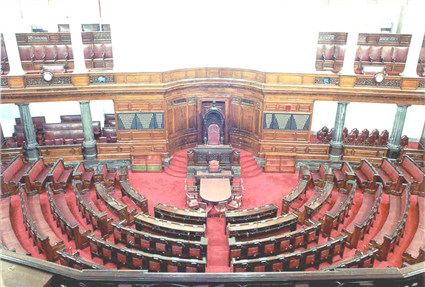Our Democracy Needs to Be Better. Fixing This Law Might Make All the Difference
We, the people, must demand more of our legislators. Only then, we can truly call ourselves a representative democracy.

Is our democracy truly representative? On the face of it, we are. Our parliamentarians are elected every five years, directly or indirectly. And unlike our neighbours, India conducts regular elections that are largely free and fair.
Having said that, there is a lot more we should be asking of our elected representatives. However, the biggest stumbling block for us is the anti-defection law.

In an attempt to check the frequent ‘Aya Ram, Gaya Ram’ defections by legislators, the anti-defection law was passed in 1985 through the 52nd Amendment to the Constitution, which added the Tenth Schedule to the Indian Constitution. This happened under the Rajiv Gandhi government.
“The evil of political defections has been a matter of national concern. If it is not combated, it is likely to undermine the very foundations of our democracy and the principles which sustain it,” said the bill’s Statements of Objects and Reasons.

As per law, the legislator becomes a defector if he/she abstains or votes contrary to the order passed by the party whip, who invariably is appointed by the party leadership.
“The crux of arguments against defection is that candidates secure votes because of their affiliation with a political party. Defecting from that party violates the trust of voters and leads to political instability. Added to it is the role of money and the promise of power that is used to engineer defections, leading to the erosion of our political processes,” says Chakshu Roy, the head of outreach at PRS Legislative Research, in a recent column for Scroll.in.
The problem with this is the assumption that the structure of inner-party democracy is strong. In reality, except for one or two parties, which at least have a semblance of inner-party democracy, the rest are basically one-man or one-woman shows, restricted to a coterie of powerful individuals.
Subsequent judgements by the Supreme Court has tightened the leash on our legislators further. As per a 1994 ruling, even criticising the party’s own policies has its consequences for legislators.
“Even in the absence of a formal resignation from membership, an inference can be drawn from the conduct of a member that he has voluntarily given up his membership of the political party to which he belongs,” the apex court said in its ruling.
Strangely enough, the courts have not come to any definitive consensus on this 1994 ruling.
On the one hand, the apex court’s 1996 ruling states that lawmakers expelled from their party can still retain membership of Parliament, but are still bound by the directives of the party whip.
Subsequently, in 2010, the court protected two expelled Samajwadi Party leaders from disqualification even though they had ignored the orders of their party whip. The court is yet to make up its mind.
Amidst all this flux, the Speaker of the House or Assembly is expected to play the role of an impartial authority in determining the validity of these cases. Recent history, however, has shown Speakers as instruments of party leadership. Fortunately, their decisions are subject to judicial scrutiny.
In the words of the apex court, “the anti-defection law seeks to recognise the practical need to place the proprieties of political and personal conduct”. The law has failed to achieve its stated objectives.

From the shameful display of bundles of cash during the 2008 vote for the Indo-US nuclear deal to the recent political farce in Arunachal Pradesh and Tamil Nadu, the evidence of its failure is clear.
Unfortunately, what the law has done is reduce our elected representatives to mouthpieces of their party leadership instead of representing we, the people, who elected them in the first place. Our legislators, who are supposed to keep the voter’s interest in mind, express apprehension in stating their independent views that we have supposedly empowered them to do on critical bills tabled in Parliament. Not only does this reduce the quality of debate, but undermines the very rationale underpinning a representative democracy.
Before the reader is one critical question. Are the people who elected the legislator more important that the party that issued the party ticket? Ideally, in a representative democracy, the people who voted for the legislator should be more important.

Let’s just take the example of Parliament, where, currently, out of 545 seats in the Lok Sabha, 462 (84.7%) are in the hands of eight parties.
If this law did not exist, the government would reach out to all required members, even those within their party, to pass a bill.
But today, practically, bills require the consent of only party leaders, which amounts to effectively leaders of eight parties—the BJP, Congress, Trinamool Congress, Biju Janata Dal, AIAMDK, Shiv Sena, Telugu Desam Party and Telangana Rashtriya Samiti.
Votaries of the anti-defection law argue that reaching out to every member would take up an inordinate amount of time, and of course, money. But as mentioned above, today you will find that eight lawmakers have the power to make decisions that affect the lives of nearly 1.3 billion people.
Our founding fathers did not envision this reality.
Read also: Newton’s Harsh Portrayal of Democracy Is Exactly Why Its Oscars Entry Is Important
Should India get rid of anti-defection entirely? Some would say yes, while others point out withdrawal would trigger parliamentary chaos. There is truth to both arguments.
A more reasonable position is that Parliament must limit its scope. As various commissions appointed to review the law have suggested, legislators could fall in line with the party whip only when the very existence of the government is in danger.
If a legislator anyway decides to vote against the party under such circumstances, he/she must seek the confidence of his constituents within six months.
For disqualification, these commissions have argued that the final authority must rest with the President or Governor, on the recommendation of the Election Commission.
Further checks and balances can come from the Governor or President’s decision being subject to judicial scrutiny.
Frankly, the current format of the anti-defection law must go. We, the people, must demand more of our elected representatives. Only then, we can truly call ourselves a representative democracy.
Like this story? Or have something to share? Write to us: [email protected], or connect with us on Facebook and Twitter.
NEW: Click here to get positive news on WhatsApp!
If you found our stories insightful, informative, or even just enjoyable, we invite you to consider making a voluntary payment to support the work we do at The Better India. Your contribution helps us continue producing quality content that educates, inspires, and drives positive change.
Choose one of the payment options below for your contribution-
By paying for the stories you value, you directly contribute to sustaining our efforts focused on making a difference in the world. Together, let’s ensure that impactful stories continue to be told and shared, enriching lives and communities alike.
Thank you for your support. Here are some frequently asked questions you might find helpful to know why you are contributing?


This story made me
-
97
-
121
-
89
-
167













